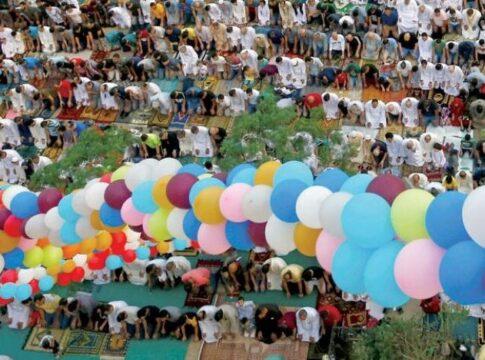In a tale that whispers across time and space, Eid al-Adha unfolds as a story of profound faith, heartfelt celebrations, and unwavering unity. It is said that the echoes of this festival resonate far beyond the vibrant kitchens and bustling prayer grounds, traveling back through centuries to a pivotal moment: a father, a son, and a test of faith that defied imagination.
Long before the aroma of spiced lamb sizzling over a fire, before the streets came alive with festive attire, there was a dream—an extraordinary vision. In the Islamic tradition, the Prophet Ibrahim (Abraham) was shown a dream where God commanded him to sacrifice his cherished son, Ismail. Yet, it wasn’t blind obedience that led Ibrahim; it was awe. The love for his child stood in stark contrast to the divine command. What was truly remarkable was not just Ibrahim’s willingness, but also Ismail’s courage as he calmly declared, “If this is God’s will, then do what you’re commanded.” In a dramatic turn of events, as Ibrahim prepared to follow through, the knife refused its task. At that moment, God provided a ram for sacrifice instead. It became clear—the test was about the profound strength of belief.
This festival is not merely a commemoration; it is interwoven with the sacred pilgrimage of Hajj. Each year, millions of Muslims from all walks of life converge upon Mecca, clad in simple white garments, their hearts beating in unison as they embark on a spiritual journey. In the Grand Mosque, they move around the Kaaba, each circle a whispered prayer, a silent plea. From here, they journey toward Mina, a canvas of white tents under the desert sky. The anticipation builds as they prepare for the Day of Arafah, where they stand in earnest prayer, as if the world itself pauses to listen. As night blankets the sky, they rest under the stars in Muzdalifah, gathering small stones for what is to come. With dawn falling, a powerful act of faith starts: the casting of stones at Jamarat. It is not an act of anger, but a symbolic defiance against inner darkness the Devil seeks in our souls. Then, Eid al-Adha arrives, and the world erupts in celebration. Across continents, animals are sacrificed, and the echoes of Ibrahim’s faith resonate within every home.
In distant lands, the festival’s spirit is alive in myriad forms. In Egypt, the morning air vibrates with the takbeerat from minarets, while in Jordan, guests are welcomed with feasts and tales of lineage. South Asia bursts with cultural fireworks—where women gather for henna nights, and homes overflow with dishes like beef biryani and sheer khurma. In the West, where Eid is not a public holiday, creativity flourishes. Mosques transform stadiums for prayers, food trucks serve delicious treats, and community centers host vibrant carnivals. Despite the busy schedules of modern life, Eid shines brightly—modern, multicultural, and filled with pride.
Eid al-Adha serves as a spiritual compass, teaching us that faith sometimes requires surrender to a higher path, that charity is a duty, and that community is as vital as family. It shows us the sweetness of celebrations shared with those less fortunate, as a portion of the sacrificial meat is given to those in need.

And so, Eid al-Adha is celebrated today in diverse cities and time zones, under different skies but with the same spirit. The pre-dawn excitement, the warmth of new clothes, the resonance of collective prayers, and the joy of shared meals—these are the threads that bind us all.
Even if one isn’t Muslim, there’s an unmistakable presence in the air during Eid—a presence of generosity, of unity, of faith. Because Eid al-Adha is not merely celebrated—it is lived with every heartbeat and every act of kindness.




